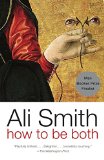Summary | Excerpt | Reviews | Beyond the book | Read-Alikes | Genres & Themes | Author Bio

A Novel
by Chris Bachelder, Jennifer HabelConfession time: even though I spent years studying English literature, even though I lived in Massachusetts for twenty years and knew people who religiously attended its annual live reading at the New Bedford Whaling Museum, I've never read what many regard as the quintessential American novel: Moby-Dick. I'm not sure if I've been deterred by its length, or its weighty reputation, or just all that talk of harpooning. My husband, on the other hand, decided to tackle Moby-Dick as a pandemic project, immersing himself in a life on the open sea just as we were feeling pretty trapped indoors.
In Chris Bachelder and Jennifer Habel's collaboratively written novel Dayswork, Moby-Dick becomes a bit of a pandemic project as well. Or rather, its author, Herman Melville, becomes an object of research, and consideration, and fascination, and perhaps mild obsession, on the part of the unnamed narrator. She and her husband are both academics, and as they try to keep up with their teaching (on Zoom, of course) and writing and overseeing the schoolwork of their two tween daughters, she engrosses herself in the life and work of Melville, an author about whom relatively little is known conclusively, though much has been written.
The Melvillian chronicle that emerges is more or less chronological, but Dayswork is hardly a straightforward biography, though it is heavily informed by the work of several biographers, most notably Hershel Parker (referred to for most of the novel simply as "The Biographer") and Elizabeth Hardwick. Dayswork itself is emphatically a novel, one that continually returns to Melville's life but that intersperses broader considerations of marriage, aging, romantic and platonic love, the life of the artist, and the elusiveness of happiness.
For, it turns out, the narrator is just as interested in Melville's long-suffering wife Lizzie as she is in Melville himself. She considers evidence that Melville might have been physically abusive toward his wife; at the very least it seems clear that he was not the world's most involved spouse or parent. From this marriage, the narrative continually circles to other relationships that both compare and contrast with the Melvilles', most notably the ill-fated marriage of poet Robert Lowell to critic, novelist, and (that's right) Melville biographer Elizabeth Hardwick, as well as the emotionally intense and mutually intellectually supportive friendship between Melville and Nathaniel Hawthorne. And, although the narrator seems to be, on the whole, happy in her own marriage, and the reader is certainly witness to her and her husband's respect for and easy conversational intimacy with one another, the weak points in their relationship do creep in, through references to a "Bad Time," which is clearly behind them now and whose contours we can only glimpse.
Much of Dayswork unfolds like that—as a series of glimpses—since nearly the entire novel is structured in very short paragraphs, each only a sentence or two, with breaks in between. This format allows the writers to move quickly from one topic or idea to another, giving readers that white space in which to pause, or consider, or shift direction. The work, which looks almost like short poems on the page, makes sense given that the husband-and-wife writing team are a poet (Habel) and a novelist (Bachelder), both award-winners in their own right.
If you're wondering whether it's possible to comprehend, much less enjoy, a novel so enmeshed with Melville even if you've never read Moby-Dick, I'm here to assure you that it certainly is. For even though it is decidedly concerned with Melville, Dayswork is, more than anything, an ode to the life of the mind, to the intellectual curiosity that leads one to spend lockdown immersed in research, that allows one to synthesize that research, to make new connections and ask probing questions even as a child jumps up and down in the next room during Zoom PE. Reading the novel is likely to awaken that same sense of curiosity, and any avid reader is likely to come away from Dayswork not only with a deep appreciation for its authors but also with a lengthy list of poems, and biographies, and other novels to read—maybe even Moby-Dick.
![]() This review was originally published in The BookBrowse Review in October 2023, and has been updated for the
September 2024 edition.
Click here to go to this issue.
This review was originally published in The BookBrowse Review in October 2023, and has been updated for the
September 2024 edition.
Click here to go to this issue.

If you liked Dayswork, try these:

by Tara Karr Roberts
Published 2025
A gorgeous debut, laced through with magic, following four generations of women as they seek to chart their own futures.

by Ali Smith
Published 2015
Two tales of love and injustice twist into a singular yarn where time gets timeless, structural gets playful, knowing gets mysterious, fictional gets real—and all life's givens get given a second chance.
Your guide toexceptional books
BookBrowse seeks out and recommends the best in contemporary fiction and nonfiction—books that not only engage and entertain but also deepen our understanding of ourselves and the world around us.